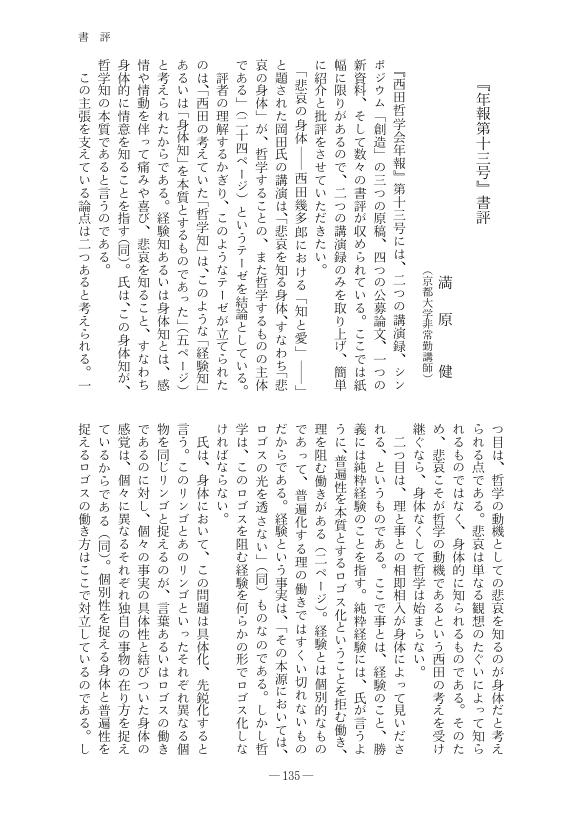1 0 0 0 OA 『善の研究』と心理主義
- 著者
- 満原 健
- 出版者
- 西田哲学会
- 雑誌
- 西田哲学会年報 (ISSN:21881995)
- 巻号頁・発行日
- vol.15, pp.159-172, 2018 (Released:2020-01-29)
In the preface of the reprint written in 1936 to An Inquiry into the Good, Nishida confesses that the standpoint of this work is psychologistic. In 1937 he again makes the same point while also insisting that his theory of pure experience is not entirely psychologistic. These statements bring up the question of what part of An Inquiry into the Good is psychologistic and what part is not. This paper is an attempt to clarify this point. According to Windelband, Rickert and Husserl, psychologism, which is the view that the mental is the ground for general validity, inevitably falls prey to relativism. Takahashi also claims that we cannot distinguish between truth and falsity if the mental is considered to be the ground for general validity. Nishida asserts in An Inquiry into the Good that the most concrete direct fact is the origin of all truths and that the criteria of truth is the state of our pure experience. In addition, he claims that truth is not independent of the subject. We can say that these assertions are psychologistic. However, Nishida also introduces the idea of a principle(理), which is the power of unification. This principle is defined not only as independent of the physical and the mental, but also as that which allows the physical, the mental and the reality to take place. These assertations allow us a non-psychologistic interpretation of his theory of pure experience.
1 0 0 0 OA 『年報第十四号』書評
- 著者
- 満原 健
- 出版者
- 西田哲学会
- 雑誌
- 西田哲学会年報 (ISSN:21881995)
- 巻号頁・発行日
- vol.15, pp.185-188, 2018 (Released:2020-01-29)
1 0 0 0 OA 『年報第十三号』書評
- 著者
- 満原 健
- 出版者
- 西田哲学会
- 雑誌
- 西田哲学会年報 (ISSN:21881995)
- 巻号頁・発行日
- vol.14, pp.135-138, 2017 (Released:2020-03-21)
1 0 0 0 OA 西田・西谷における論理
- 著者
- 満原 健
- 出版者
- 西田哲学会
- 雑誌
- 西田哲学会年報 (ISSN:21881995)
- 巻号頁・発行日
- vol.7, pp.105-117, 2010 (Released:2020-03-23)
Der Gedanke Nishitanis hat ziemlich viel Ähnlichkeit mit der Philosophie Nishidas. Andererseits gibt es einige Differenzen zwischen den gedanklichen Inhalten der beiden Denker. Eine der Differenzen ist das Verständnis der philosophischen Logik: Nishida fasst die Logik sehr positiv auf, dagegen eher Nishitani negativ. Der Zweck dieses Aufsatzes ist die Klärung des Grundes dieser Differenzen. Nishitani findet in Nishidas Philosophie zwei Probleme: die Unklarheit des Verhältnisses der Logik zum sie Überschreitenden und die Unvollständigkeit der Platzierung der verschiedenen Aspekte philosophischer Logik. Um die verschiedenartigen Spielarten der Logik unter einem System zu platzieren und diesen die eigene Bedeutung zu geben, versucht Nishitani zu klären, wie die Selbstnegation sich in diesen Aspekte der Logik zeigt. Nishitani denkt, dass auch Nishidas Logik Elemente der Selbstnegation aufweist. Nishitani sieht diese Selbstnegation als die Erscheinung der Kraft absoluter Negativität an, die für Nishitani das die Logik Überschreitende ist. Im Unterschied zu Nishida findet Nishitani die Bedeutung aller philosophischen Logik durch diese Selbstnegation oder durch die absolute Negativität. Das ist eben die Einheit aller Logik, die in Nishitanis Denken vorherrscht. Nishitani muss daher die Logik negativ auffassen, und darin besteht auch der Grund der Differenz zwischen den Gedankeinhalten der beiden Denker.

